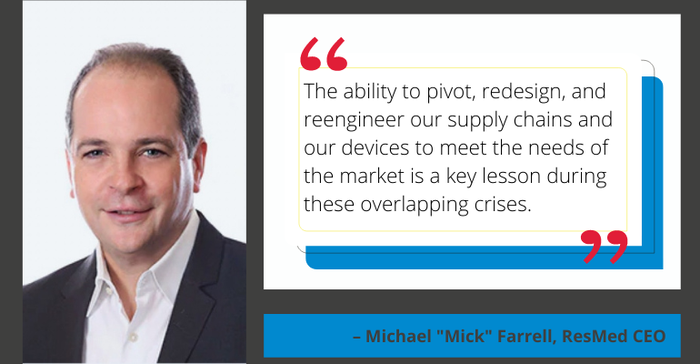ResMed Navigates 'Perfect Storm' with Guiding Principle
MD+DI editors pick ResMed for 2022 Medtech Company of the Year.
December 20, 2022

It's not in times of smooth sailing that a company shows us its true colors, but in times of rough waters. That's why this year, MD+DI editors named ResMed the 2022 Medtech Company of the Year out of 10 finalists.
While the company has certainly benefited from Philips' massive recall on ventilators and CPAP machines, the unprecedented demand created by the competitor's recall, on top of pandemic-related challenges and the global supply chain crisis, has created a perfect storm for ResMed. Through it all, the company's guiding principle has been to "provide the gift of breath to as many people as possible, as quickly as possible, prioritizing those with highest-acuity needs," CEO Mick Farrell told MD+DI. "This focus on the patient has been a true North Star for ResMedians, and all of our customers, as we navigate the perfect storm caused by these overlapping crises."
In the 12 months ending September 30, ResMed devices helped change more than 144 million lives through its solutions for sleep apnea, chronic obstructive pulmonary disease, asthma, and insomnia. But the company's goal is to continue to innovate its solutions and advocate for better access to them in order to improve 250 million lives in 2025, and even more in the years that follow.
How ResMed has responded to the supply chain crisis

Farrell said laser focus on the needs of the patient has guided ResMed as it designs, develops, and delivers products. With the supply chain crisis producing only a limited supply of semiconductor chips, the company made the decision to pivot and temporarily provide AirSense 10 Card-to-Cloud devices, without comms chips, to ensure more people could get the home treatment they need. So, the San Diego, CA-based company now has three sleep apnea devices on the market: the AirSense 11, the AirSense 10, and the AirSense 10 Card-to-Cloud.
"The ability to pivot, redesign, and reengineer our supply chains and our devices to meet the needs of the market is a key lesson during these overlapping crises," Farrell said. "The bottom line is that all of us ResMedians know exactly where our North Star is – the person who is suffocating and needs our help desperately… and millions of people, and their clinicians, sleep better at night for it."
The constrained supply of electronic components has been the most significant aspect of this perfect storm for ResMed. The company has built the "largest manufacturing facility for respiratory medical devices on the planet, with enough capacity to meet the entire market demand today," and it has the dedicated workforce to make all the CPAP, APAP, bilevel, and life support ventilator devices needed, Farrell said. There's simply not enough semiconductor chips.
"The only thing standing between tens of millions of people from having the cloud-connected, lifesaving respiratory medical solution they need on their bedside table right now is an adequate supply of semiconductor chips," he said.
The CEO said ResMed is actively engaged in multiple concurrent supply chain workstreams as it continues to do everything it can to secure additional supply to further increase production of its devices. This includes securing additional flow of existing parts from existing suppliers, establishing flow of existing parts from new suppliers, validating and verifying new parts from existing and new suppliers, and reengineering current designs to work around component bottleneck issues.
"In the last 12 months, and beyond, I have personally been on direct phone and video calls urging our suppliers, and their suppliers, and their suppliers – five, six, seven levels up the supply chain – asking them to prioritize medical device customers, like ResMed, who need semiconductor chips to put directly into life-changing and lifesaving devices, Farrell said. "We are not stockpiling, every rate-limited component goes straight to a manufacturing line to make a device that is then shipped directly to a customer – ultimately helping a patient breathe. Does the world need one more smartphone, one more electric car, one more cloud-connected home appliance, or one more medical device that can save a life? You would think that the choice is easy. All of our combined efforts will help minimize the time it takes ResMed to meet the world’s demand for our solutions, change lives, and ultimately save lives."
ResMed went digital before digital was cool
"We’ve been working with customers for over two decades to bring digital health into medtech – well before it was cool to do so," Farrell said.
This experience, and especially the last eight years since launching the AirSense 10 with 100% cloud-connectable capability, has helped the company pass 19 million cloud-connected devices on bedside tables in 140 countries worldwide. ResMed has collected more than 12.5 billion nights of respiratory medical data that supports the company's ability to serve patients, respiratory therapists, physicians, and other healthcare providers.
More than 5 million ResMed users have signed up for the company's myAir app, which shows their own data on their smartphone each morning, along with personalized tips for improving treatment.
"Over 20 million users can get the benefits of remote monitoring – their clinicians can quickly manage an entire group of patients on cloud-based software, called AirView," Farrell said. "This solution alone can save providers up to 59% in labor costs related to patient management, and more important, it can lead to better clinical and patient-satisfaction outcomes."
Farrell said ResMed device users who are remotely and self-monitored are up to 87% adherent on treatment, compared to roughly 50% to 60% on a standard device.
"Digital health solutions, combined with the smallest, quietest, and most comfortable medtech solutions, make all this possible, and that’s why digital health is central to ResMed’s long-term vision for growth and success, always keeping the patient at the center of everything we do."
About the Author(s)
You May Also Like



.png?width=300&auto=webp&quality=80&disable=upscale)
